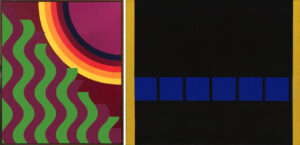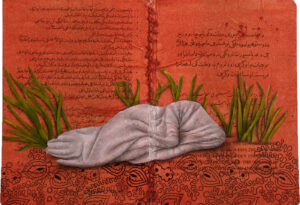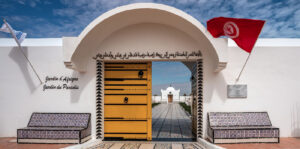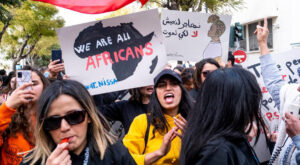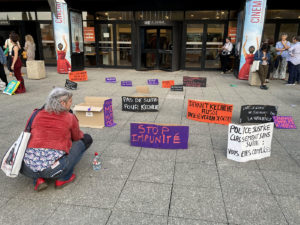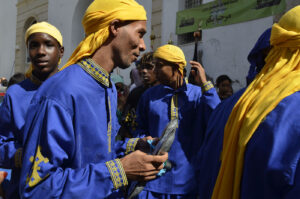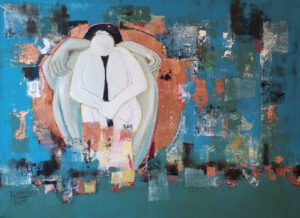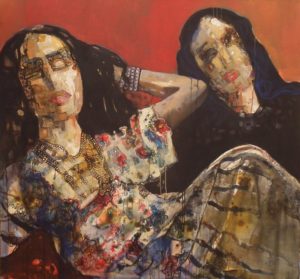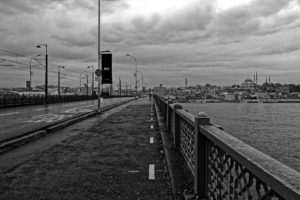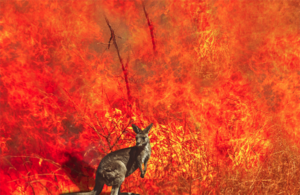Sarah Ben Hamadi
On October 19, 2022, a four-year-old Tunisian girl arrived on the island of Lampedusa in Italy, alone, on a clandestine migration boat. Yes, you read that right, she is only four years old and she arrived on the Italian coast unaccompanied after a crossing of more than 24 hours. There are no words to describe the situation. Images of the girl, filmed discreetly on Italian television without showing her face, shocked the whole country.
Back in Tunisia, arrested by the authorities, the father claims that he too was supposed to leave with his wife and his other daughter, who is seven, but said that they stayed on the beach where the boat departed hastily in a moment of panic. The parents were taken into custody for “abandonment of a minor.”
While the media and public opinion on social networks argued about parental responsibility, I couldn’t get those painful questions out of my head: What is happening in my country? How did we get here? Why do we prefer to risk death in makeshift boats than to stay in Tunisia? I admit that I don’t have any answers, as the situation is infuriatingly complex.
Synonymous with social failure and heartbreak, the “harga” (a term referring to illegal immigration in Tunisian dialect — literally burning in English — in reference to the fact of burning one’s papers in order not to be deported to one’s country of origin) has become a life project, even a family project at times.
The “bambina” affair is just one of many dramas this autumn. The same week, the Tunisian coast guard recovered the bodies of 15 migrants of different nationalities, off the coast of Mahdia (200km from Tunis). A few days earlier, a sweep off the coast of Zarzis (a coastal town in southern Tunisia) recovered eight bodies, which could be those of people who disappeared at sea on September 21 and whose families have been waiting for news ever since. This is not the first time and certainly won’t be the last that such a tragedy has occurred — except that this time around, bodies have been exhumed. They were buried without their families being informed. Accused of negligence, the authorities are struggling to contain the anger of residents and families of the missing migrants. Roads in Zarzis were closed and tires were burned. Fishermen mobilized voluntarily for days to search for the bodies at sea. A one-day general strike was observed.
The Mediterranean has become a road of death, and Tunisia a cemetery of hope.
In 2022 alone, 15,395 illegal migrants reached the Italian coast, according to the NGO Tunisian Forum for Economic and Social Rights (FTDES), Among them, were some 2,000 minors and nearly 600 women. “We went from 73 women in 2019 to nearly 600 in 2022,” says Islam Gharbi, member of FTDES. The cause is Tunisia’s high unemployment rate and financial difficulties. According to the same NGO, “more than 540 illegal immigrants have gone missing since the beginning of 2022.”
And despite the recurrent dramas, these clandestine departures have become commonplace. Entire families leave at their own risk, and some haragas (illegal immigrants) have begun to film and share their crossings on social networks. This new phenomenon is perhaps as surprising as it is deplorable. In 2021, an 18-year-old Instagrammer, who had nearly 200 thousand followers at the time, published a video of her crossing to Italy, delighted to have succeeded. She turned the perilous journey by boat into a banal Instagrammable crossing. Placed in a detention center, the girl continued to publish stories of her daily life, which she attempted to glamorize.

Aware of illegal immigration’s increasing magnitude, in 2020 Tunisian national television produced a soap opera called simply “Harga.” Broadcast for two seasons, the series dwells on the reasons that push Tunisians to attempt the harga, as well as the restrictive migratory policies of European countries, and the difficulties illegal migrants encounter in Europe…when they do not lose their lives at sea.
With “Harga” director Lassaad Oueslati wanted to address a phenomenon that has become “almost commonplace.” Beyond the financial difficulties, he found “a loss of attachment of young people to their country.”
Interviewed in Le Monde, Oueslati said, “I had to make this series because this issue effects us all on a daily basis. Every Tunisian has in his entourage someone who has emigrated illegally. To create the characters and a realistic decor, I went to Sicily with my producer and we met many Tunisians in an irregular situation, whether in detention centers, hotspots [registration points for migrants upon arrival in Europe], or in the streets. I also conducted interviews with the families of nearly 500 people who disappeared at sea and whose relatives have neither the bodies nor proof that they died.”
A widespread malaise
If illegal immigration has often been perceived as a problem affecting the poor, marginalized fringe of society, Tunisia is now facing another phenomenon, a brain drain, for in the midst of the socio-economic crisis that has persisted since the 2011 revolution, middle class Tunisians are flocking abroad through legal channels as well.

“And you, why are you staying?” “Don’t you want to leave?” “What is keeping you here?” These questions are now part of most discussions. Every week, we hear about a person, a couple or even a family in our circle of friends who drops everything to go abroad, often to France, Germany or Canada.
Among those who emigrate are individuals who seemed to have a comfortable situation here in Tunisia. First of all, there are the doctors, whose departure is causing such a hemorrhage that the Franco-German channel Arte devoted a report to it, titled “Tunisia: The great exodus of doctors.” Each year, nearly a thousand doctors leave for France, a country that is itself experiencing a shortage and which therefore benefits from these departures. Highly trained and mastering the language of Molière, Tunisian doctors do not find it difficult to work for French hospitals. Engineers are not left out, either: between 2015 and 2021, 39,000 engineers left the country, according to the President of the Tunisian Engineers’ Council.
While Tunisia can pride itself on the fact that many young people are well educated, these massive departures reveal a general malaise in the country and a particularly deep malaise felt by our youth. This is a crisis that the state is failing to react to, either out of denial or insufficient vision. For if illegal immigration can sometimes reflect a lack of prospects, the massive departures through regular channels show that the reasons are not always financial. Between disenchantment and uncertainty, Tunisians now find it difficult to believe in a better future in their country, for themselves or for their children.
In his novel The Disoriented, Amin Maalouf wrote, “The disappearance of the past is easy to console oneself with; it is the disappearance of the future that one does not recover from. The country whose absence saddens and obsesses me is not the one I knew in my youth, it is the one I dreamed of, and which could never see the light of day.” Maalouf’s nostalgia may evoke his native Lebanon, once torn by war, but to me it calls to mind Tunisia today. For many of us who once experienced the hope of revolution in January 2011, disillusionment has characterized much of the decade that followed.
This was to have been a decade we expected would be sufficient to establish a democracy and get back on the road to development, but which has turned out to be chaotic, as successive governments have failed to provide the slightest solution to the country’s structural problems. Worse, these problems have accumulated, and today we find ourselves wracked by an economic crisis along with political instability. Young Tunisians — who after the renewed pride of belonging to what was described as “the only Arab democracy” — now find themselves in a situation where the country represents in their eyes only obstacles and difficulties.
I remain convinced that the country has a lot of potential and that there are still things to do here. Tunisia can be turned around if it is put in the right hands. Now, with this disenchantment, one cannot help but wonder about our future. What if nothing changes? What if the situation gets even worse? What if I aspire to something better? These are legitimate questions in this gloomy atmosphere.
There is a saying making its way around social networks lately: “We love you, Tunisia, but you have made it very difficult.” I think that sums up the state of mind that many of us are in.
Tunisia is hemorrhaging haragas, which has me worrying first about the problem of the infringement on the right to mobility, and all the restrictions imposed by the countries of the northern shore of the Mediterranean. These people choose clandestine migration because it is impossible for them to leave via regular channels, even for a tourist trip. Secondly, there is a feeling of sadness mixed with helplessness. To see people so desperate that they would rather risk their lives at sea than stay here is painful. And to observe that the state manages this problem only from a security angle, unable to find a solution, is revolting. Even if one is in a comfortable situation, you cannot be insensitive to this crisis.
It is time to sit down and analyze what is going on: Yes, there is a great social malaise. How to remedy it and give hope to these young people and to forlorn families? How can we give them confidence in their country again, and demonstrate that the grass is perhaps not greener elsewhere? How to make them dream at home? A whole strategy must be put in place.










